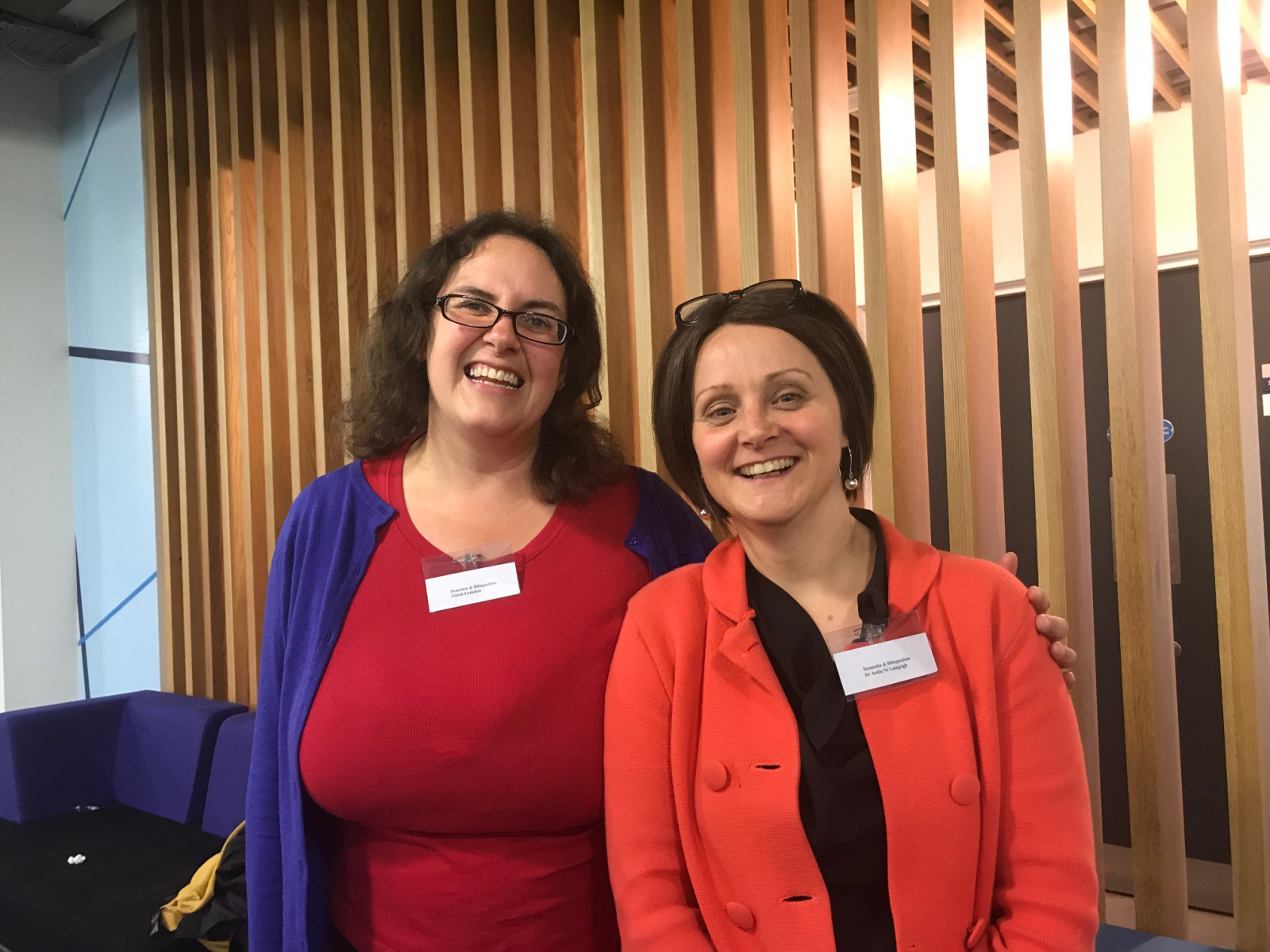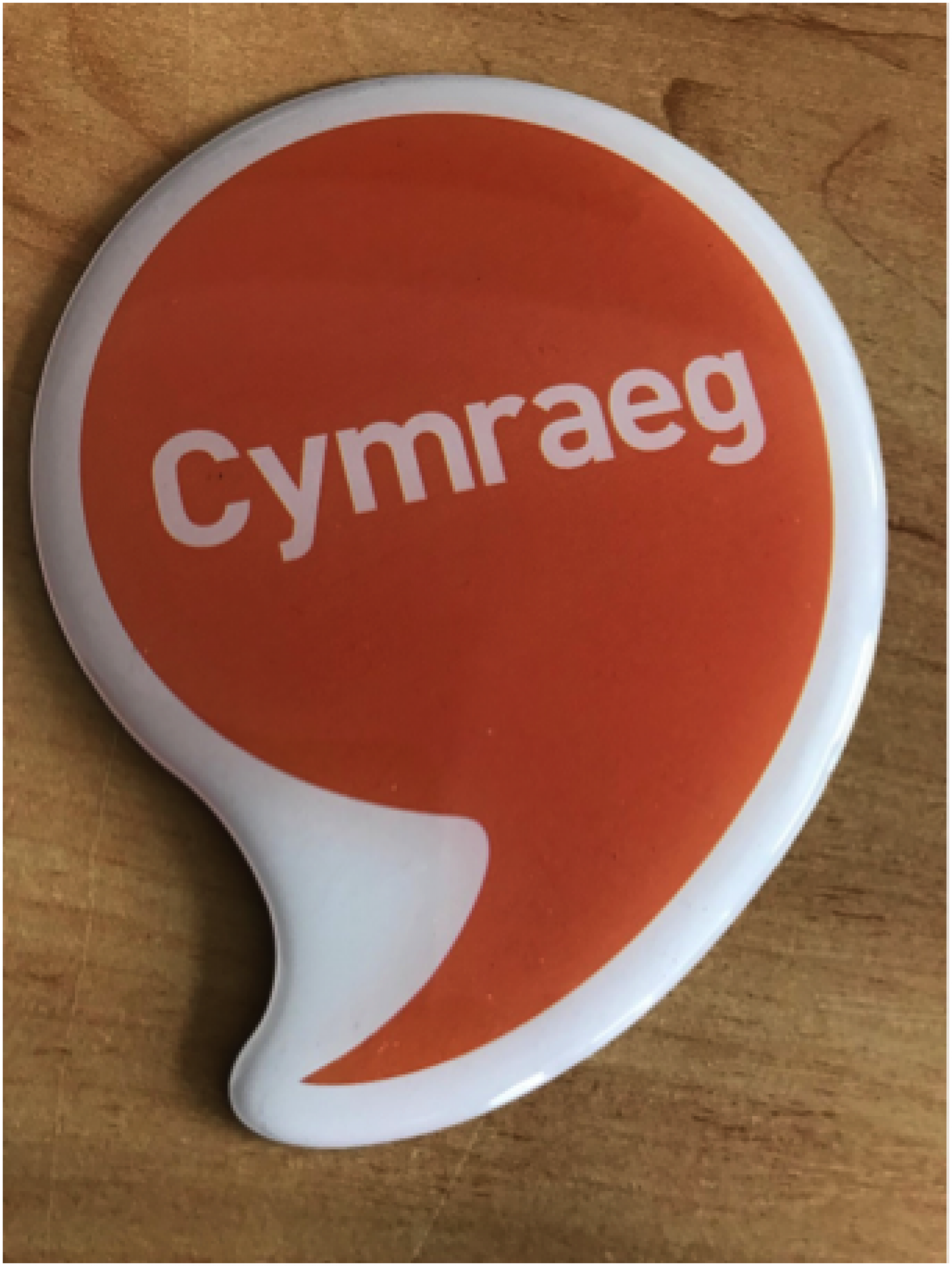Dementia and Bilingualism
Back to all

Cuimhne Coordinator Zibiah with Dementia and Blingualism conference coordinator Dr Aedin Ni Loingsigh from the University of Stirling
Zibiah Loakthar our Cuimhne Coordinator writes
Cuimhne joined academics, dementia activists, linguists, medics, community practitioners, carers, writers and performers at CUIMHNICHIBH OIRNN – REMEMBER US, a day conference on Dementia and Bilingualism at the Insight Institute in the University of Strathclyde in Glasgow on 26 June 2019. This performance–led day created a very different kind of event to the usual format of academic and voluntary sector conferences.
A dramatic reading of the play “Five to Midnight” portrayed the experiences of “Mary” who with the onset of dementia begins to lose her ability to speak in English and returns to Scottish Gaelic, her mother tongue. The play, performed in parts, was interspersed with audience reflection and three panel discussions on 1.bilingualism in the medical context, 2.dementia’s impact on the family and the bilingual community and 3.bilingualism and the arts.
The play promoted much discussion about changing roles, relationships and power dynamics within families affected by dementia and particularly by semantic dementia. Mary’s husband “John” does not speak Gaelic but with time comes to terms with his family’s new situation, recognising that he is not too old to start learning and to develop new ways of communicating with Mary. Meanwhile, Mary’s adult son finds himself being pulled into the not always comfortable role of interpreter between his parents and those around Mary who do not understand Gaelic.
As Mary’s dementia progresses, she becomes increasingly cut off from the English–speaking world. Audience members without Gaelic language skills are exposed to more and more Gaelic monologues and conversations as the play unrolls, like John’s experience of being increasingly locked out of Mary’s world.
This experience fosters audience empathy with characters in the play separated by language divides. Importantly, the play highlights the multi–modal nature of communication: we can learn about each other from gesture and posture as well as spoken words and, rather than giving up, can creatively find new ways to communicate.
The play is still evolving into its final version. When ready for tour we would love to invite playwrights, translators and performers to come and share and discuss it with our Irish in Britain Cuimhne groups.
For our own Cuimhne presentation about dementia’s impact on the family and the bilingual community, we shared a platform with Wilson McLeod from the University of Edinburgh and Meinir Jones from the Welsh Language Commission’s communications team. We shared Irish in Britain’s real, anonymised, case examples of people in the Irish community returning to speaking in Irish (“Gaeilge” not “Gaelic”) and discussed the valuable work of Irish community organisations in giving culturally and often linguistically sensitive care.
Family, friends and community members can sometimes be completely taken by surprise when a person they have only ever heard speaking English returns to speaking a mother tongue. Our community organisations here can offer a valuable network of support for family members at a loss as to how to speak to each other. Indeed, organisations like Conradh na Gaeilge Glaschú based in Glasgow and Conradh na Gaeilge i Londain, based in London (both members of Irish in Britain), offer activities to support people interested in developing or acquiring new Gaeilge language skills. Within Irish groups across Britain there are people with Gaeilge language skills offering to visit people who may be isolated in home, hospital or care home settings.
We explained how rather than pathologising people living with dementia, our Cuimhne team advocates a more holistic and joined up approach. There are huge benefits for everyone where medical and health agencies and social community and cultural organisations link up to work together.
We also spoke about the phrases that Irish people sometimes use which may sound like English but do not make much sense in an English–speaking context – “putting my messages in the press” and “what’s the story, horse?” are examples. “Any craic?” or” “what’s that yoke?” can also somewhat flummox English speakers! These kinds of expressions, when not understood in their Irish cultural context by listeners, can lead to a person being misjudged as being muddled and confused!
As for the importance of trying to pronounce names correctly – Sean, Ruairi, Cillian, Roisin addressed by a name that does not sound like their own may not respond! Making time to ask people admitted into hospitals and care homes about how their names are pronounced can have such a big impact upon their experience there. It can also be useful to ask people and their family members about languages people might prefer to be spoken to in. Books like our Irish in Britain My Story book can play a very important role in helping to introduce to care staff the real person behind the “patient”.

badge in welsh
Over the course of the day people shared examples of good practice working with people living with dementia who might find themselves returning to speaking in a language of their youth. Arranging for nursery and school children to visit people in care homes and connect through singing of songs in different languages was one, providing badges for people to wear or have attached by magnet to a hospital bed to indicate their preferred language was another.
The conference also highlighted how language learning can help keep the mind active and may sometimes play a protective role against the onset and development of dementia. It was especially interesting to hear from Lingo Flamingo, a Scottish social enterprise offering tailored foreign language workshops to older adults and to people with dementia. One of Lingo Flamingo’s aims is to counter the stereotype that older adults and people living with dementia are incapable of learning new information.
There can be a stigma about language learning – sometimes older people can recall experiences of learning languages at school where they might have been punished, perhaps even getting the belt, for making a mistake. Lingo Flamingo is doing some great work to connect people with joy and fun in language learning!
A section of the day has been covered by the BBC here. Interestingly, if you enter this text from the BBC website:
Chaidh dà–chànanachas agus dementia a dheasbad aig tachartas sònraichte aig Oilthigh Shrath Chluaidh an–diugh. Thug a’ bhùth–obrach, air an tugar “Cuimhichibh Oirnn”, luchd–dràma agus eòlaichean còmhla airson beachdachadh air mar a ghabhas an cùram as fhèarr lìbhrigeadh do dhaoine dà–chànanach a tha a’ fulang leis an tinneas. Bha am fear–naidheachd againn Ruairidh MacÌomhair an làthair.
into google translate it turns into this:
“Bilingualism and dementia were discussed at a special event at Strathclyde University today. The workshop, entitled “Remember Us”, brought together a pool of drama professionals and experts to discuss how to deliver the best possible care for bi–lingual sufferers. Our journalist Roddy MacIver was in attendance.”
This just serves to highlight the importance of good language translation! Labels matter! People in equality and disability rights fields have long campaigned against the language of terms like “dementia sufferers”, preferring those who live with dementia. Bilingualism is not an affliction, an alternative reading of this google translation! We may have internet tools and technology literally at the tips of our fingers, through our phones, that can assist with language interpreting and translation but there is no substitute for human interpreters to help understand the subtle meanings conveyed by words and avoid errors.
Some of us may recall a recent news story about a comic error in translating Cwmbran’s Asda’s sign for the alcohol–free section as “free alcohol” in Welsh!
The day was sponsored by Soillse, The National Network for the Maintenance and Revitalisation of Gaelic Language and Culture and the University of Strathclyde. In this year of 2019, the UN year celebrating Indigenous languages, the conference also served to focus attention on the importance of attending to and caring for minority languages. Each language has its own richness and subtleties in meaning, offering different perspectives on the world. We are a poorer world when we impose one language over another and expect everyone to “fit in”.
Minority languages are by definition languages spoken by fewer people but this does not make them minor in stature or richness of expression. Good dementia care, putting person at the heart of care, can recognise that people may feel able to express themselves more richly in a minority language and seeks ways of meeting this need.